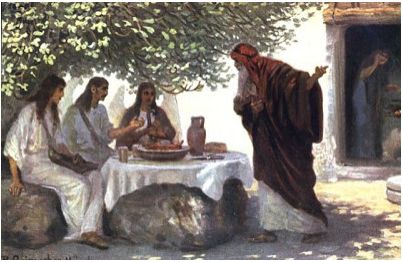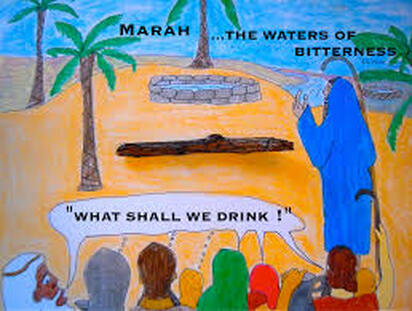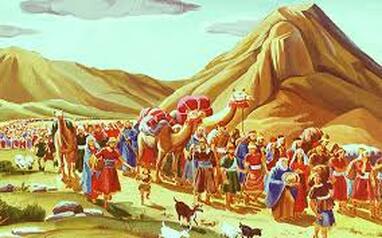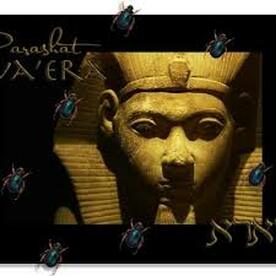
וגר לא־תונה ולא תלחצנו כי־גרים הייתם בארץ מצרים׃
(22:20) "You must neither wrong nor oppress a foreigner living among you, for you yourselves were foreigners in the land of Egypt.
(Exo 22:21)
THE GREAT COMMANDMENT OF HOSPITALITY
The parasha this week addresses something that has become today more of a matter of personal choice, but that in the days of ancient Israel would have been considered as paramount to a Torah observant life. I am talking about hospitality.)
As HaShem delivers His people from slavery, He wants them to never forget their former state. Why? The end of the story, the end of the game, is that every knee shall bow to Him and that every tongue shall confess and praise Him. Not Israel only, but the whole of humanity. As the smallest of all nations, as the weakest of all peoples, HaShem chose Israel in order to show the rest of the world that if He could use such a small nation, such a small people, and I would add, such a stubborn and stiff necked people, he could use us too.
Adonai didn't set his heart on you or choose you because you numbered more than any other people - on the contrary, you were the fewest of all peoples. Rather, it was because Adonai loved you, and because he wanted to keep the oath which he had sworn to your ancestors, that Adonai brought you out with a strong hand and redeemed you from a life of slavery under the hand of Pharaoh king of Egypt. (Deu 7:7-8)
HASHEM’S GREAT LOVE AFFAIR WITH ISRAEL
The intense love affair between HaShem and Israel is beautifully depicted in Ezekiel 16 where in a poetic way, under HaShem's inspiration, the prophet describes the Exodus from Egypt; the time when HaShem looked at Israel, soiled a dirty and took her in his bosom. Here is a sample.
" 'Again I passed by you, looked at you and saw that your time had come, the time for love. So I spread my cloak over you to cover your private parts and entered into a covenant with you,' says Adonai Elohim, 'and you became mine. Then I bathed you in water, washed the blood off you, and anointed you with oil. I also clothed you with an embroidered gown, gave you fine leather sandals to wear, put a fine linen headband on your head and covered you with silk. I gave you jewelry to wear, bracelets for your hands, a necklace for your neck, a ring for your nose, earrings for your ears and a beautiful crown for your head. Thus you were decked out in gold and silver; your clothing was of fine linen, silk and richly embroidered cloth; you ate the finest flour, honey and olive oil. You grew increasingly beautiful -- you were fit to be queen. Your fame spread among the nations because of your beauty, because it was perfect, due to my having bestowed my own splendor on you' says Adonai Elohim. (Eze 16:8-14)
He adopted us not because we were deserving, but solely because He loved us.
REMEMBERING WHERE WE COME FROM
HaShem wants us to never forget these early humble beginnings. He wants us to reflect often on these times. It is only by remembering these early beginnings that we can have the mercy that it takes in order for us to have compassion on the stranger within our midst, and remember to “neither wrong nor oppress a foreigner living among you” (Exo 22:20 (21)). We are only able to show hope to others as we remember our early beginning. We can show them mercy only as we remember our sinful ways. We can only show care and compassion as we contemplate our former oppression. When we forget where we come from, when we forget our former state, when we forget our sinful condition, we only show disdain, arrogance, and indifference.
THE MANDATE
As He has been with us, we are mandated to be with others from the nations. Israel is mandated to show the nations, and to the stranger in its midst, the same care, love, and hospitality that HaShem showed to her. We received his blessings for free, freely we should share them with the world.
Israel left Egypt with a great multitude from the nations (Exo 12:38)). So as Israel became a nation, it right away had to deal with the issue of non-Israelites in its midst, an issue which HaShem addressed right away, because he knows the sectarian separatist heart of man. HaShem made sure that, in his status of “chosen people”, Israel did not develop a spirit of elitism.
This commandment seems to peer into the future, to a time when the nations will flock to the house of Jacob in order to hear the word of the Lord. Not counting that for 2000 years now, ⅔ of the world has learned about the God of Abraham, in some form or another, live by a seven day week, and have a judicial and moral code based on the 10 commandments However, now many are flocking around His Jewish children in some form or other in order to learn from the Torah.
As Jews, we are mandated in the command of Exodus 22:20(21) to receive these people from the nations with the same grace that HaShem received us. We should never look down on them or have a distant aloof attitude towards them. We must freely extend to them the same hand of fellowship that HaShem freely extended to us.
THE STRANGER IN THE ENDTIME
Through the inspiration of HaShem, Isaiah said,
A foreigner joining Adonai should not say, "Adonai will separate me from his people"; likewise the eunuch should not say, "I am only a dried-up tree." For here is what Adonai says: "As for the eunuchs who keep my Shabbats, who choose what pleases me and hold fast to my covenant: in my house, within my walls, I will give them power and a name greater than sons and daughters; I will give him an everlasting name that will not be cut off. "And the foreigners who join themselves to Adonai to serve him, to love the name of Adonai, and to be his workers, all who keep Shabbat and do not profane it, and hold fast to my covenant, I will bring them to my holy mountain and make them joyful in my house of prayer; their burnt offerings and sacrifices will be accepted on my altar; for my house will be called a house of prayer for all peoples." Adonai Elohim says, he who gathers Isra'el's exiles: "There are yet others I will gather, besides those gathered already." (Isa 56:3-8)
Thé Talmud tells stories of how Abraham used to invite people to his tent to eat and hear about his God. Later we hear about Rachab and Ruth as examples of those foreigners accepted in the fellowship of Israel. They are even mentioned in the genealogy of the Messiah (Mat 1-5) (those whom HaShem accepts, who are we to reject?)
Later, King David built a Tabernacle that Amos prophesied would be the rally point for Israel and the nations. When faced with the decisions concerning gentiles turning to HaShem, James was reminded of the Amos prophecy concerning the broken tabernacle of David.
Ya`akov broke the silence to reply.
"Brothers," he said, "hear what I have to say. Shim`on has told in detail what God did when he first began to show his concern for taking from among the Goyim a people to bear his name. And the words of the Prophets are in complete harmony with this, for it is written,
' "After this, I will return; and I will rebuild the fallen tent of David. I will rebuild its ruins, I will restore it, so that the rest of mankind may seek the Lord, that is, all the Goyim who have been called by my name," says Adonai, who is doing these things.' All this has been known for ages.
(1 Chron 15-16)/(Amos 9:11)/(Act 15:13-18)
,
From Abraham to John the Revelator, all the prophets have seen and foreseen the day when the nations will join themselves to Israel. Regardless of practical and theological issues, it is the grand plan, a plan which Yeshua came to initiate.
Just before he ascended to the Father, Yeshua told the disciples to wait in Jerusalem. Ten days later on Shavuot a miracle happened which Peter interpreted as initiating the time when the Spirit of God will no longer be allowed only upon the Jewish people, but also on those from the nations who turn to Him.(Joel 8:28; Acts 2)
May we accept others even as He accepted us!
R' Gavriel Lumbroso



 RSS Feed
RSS Feed